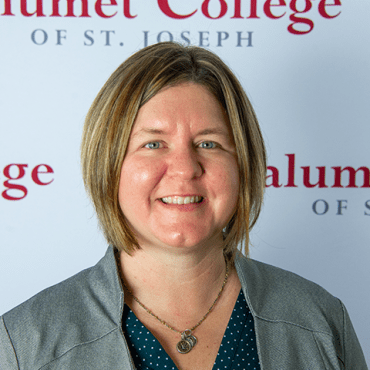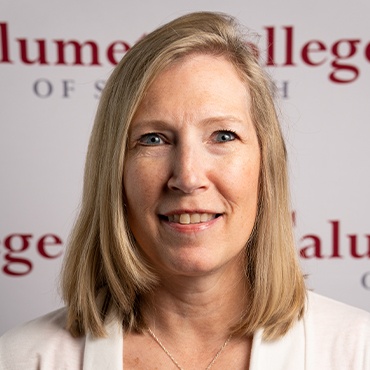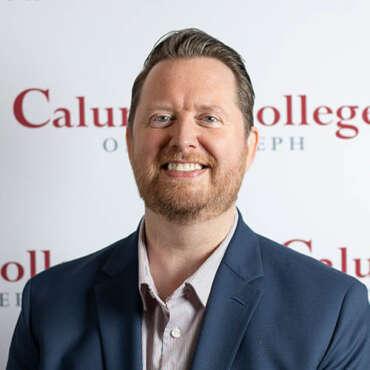
Elementary Education Program
CALUMET COLLEGE OF ST. JOSEPH’S ELEMENTARY EDUCATION PROGRAM OFFERS A FOUNDATION THAT SUPPORTS YOUR DREAM TO TRANSFORM A COMMUNITY.
Calumet College of St. Joseph’s Elementary Education program supports the mission of the College to prepare a diverse population for professional careers and graduate education. Guided by a Catholic vision of social justice, the education program empowers teacher candidates to improve their personal lives and to create a more equitable society through education.
In the Elementary Education program, teacher candidates will receive justice-oriented educational experiences that reflect current theory and best practice in the profession according to three essential and interrelated pillars:
- Professional preparation
- Continuous and critical reflection
- Ongoing personal and professional transformation
Candidates will also gain real-world experience in:
- Teaching students in a variety of settings
- Advocating for the needs of diverse students through community projects
- Building a professional learning network
Throughout the four-year program, field and clinical experiences will connect candidates with professionals in the field, see best practices in action and gain confidence as an educator.
Request Information
Program Highlights
Hands on Learning
The Elementary Education program integrates classroom observations and visitations into nearly all of the education courses to allow our students to see course content in action and practice in the classroom setting. Our instructors take students to schools throughout Northwest Indiana that reflect the diversity of our region.
Experienced Instructors
All instructors in our program have prior and recent experience in K-12 classroom settings across a broad spectrum of schools, ranging from urban, suburban, and rural, to Catholic, public, and charter. Their experiences offer a broad perspective of current education methodologies, strategies, curriculum, and technology integration to prepare our students for future careers in multiple school settings.
Rooted in Service
All of our courses are rooted in the college’s mission of social justice and ethic of service, with the hopes that our students will feel called to work in schools and communities that are in need of qualified, dedicated teachers!
Faculty
Nicole Avina, M.A.
Adrienne Cataldo, M.A.
Sean Egan, Ed.D
Alyssa Rodriguez, M.S.
Cheryl Rothman, M.A.
Keith Werosh, Ph.D.
Career
Options
Career Options with this major include but are not limited to:
- Instructional Coordinators – $74,620
- Special Education Teachers – $65,910
- Kindergarten and Elementary School Teachers – $63,670
- Tutor – $39,580

Frequently Asked Questions
Teaching is one of the most challenging careers a person can pursue. Expect to work long hours in what can be a highly stressful environment. However, teachers hold the power to influence their students’ lives very deeply, which can be very rewarding.
- Passion: You’re passionate about children and learning, and you want to help students reach their full potential.
- Patience: You’re generally calm and patient, which can help you stay goal-oriented and help students understand their mistakes.
- Lifelong learning: You enjoy learning new things and expanding your knowledge base.
- Communication skills: You can deliver information in an easy-to-understand way, and you can speak confidently to students one-on-one.
- Positive attitude: You can let go of depressing things and greet your students with a happy face.
- Sense of humor: You can bring your personality and sense of humor to the classroom.
Teachers can advance their careers in many ways, including promotions, role transfers, and new positions. These opportunities can offer more responsibility, professional development, and higher compensation. Some advancement opportunities may require teachers to earn additional certifications or degrees.
In Indiana, the average salary for teachers (2023) was $58,531. In Illinois, the average teacher salary (2024) was $73,916. More specifically, the range of teacher salaries in Chicago Public Schools was between $66,000 and $93,000, depending on the level and type of teacher position. Salaries differ broadly between rural, suburban, urban, public, private, and charter districts.
Program
Objectives and requirements
Five major program objectives have been defined under the three pillars: Preparation, Reflection and Transformation. Program graduates are required to:
- Demonstrate understanding of how students learn and how they differ by way of understanding how students learn and differ by way of Preparation.
- Demonstrate knowledge of what to teach by way of Preparation.
- Demonstrate how to teach effectively as Transformation.
- Demonstrate effective implementation of technology as Transformation.
- Demonstrate continuous personal and professional growth by way of Reflection.
To ensure that teaching candidates are prepared to handle the rigorous coursework and ultimately become teachers, they must meet the following admission criteria to enter the Education Program:
- Good standing with CCSJ
- Successful completion of a majority of General Education courses
- Cumulative GPA of at least 2.50 on a four-point scale
- Completion of EDUC 200 and EDUC 405 with a grade of C or higher
- Full criminal history clearance via Safe Hiring Solutions (updated annually)
- Demonstration of basic skills proficiency through one of the following
- Praxis CORE exams (at or above 165 in Mathematics, Reading, and Writing)
- ACT test (composite score at or above 20)
- SAT test (at or above 530 in Evidence-based Reading and Writing and Math)
120 CREDIT HOURS
38 hours: General Education
Students must complete the following:
- MATH 171 Principles of Statistics
- HIST 110 American Civilization
- PLSC 220 American Political System I
7 hours: Additional Requirements for Licensure
- MATH 104 Precalculus or
- MATH 110 Finite Mathematics
- ________ Additional General Education Science Selection
0 hours: All students identified as pursuing a B.S. Degree in Education must be enrolled every fall and spring semester in:
- EDUC 299 Teacher Education Seminar
6 hours: Prior to acceptance to the Teacher Education Program, candidates must complete:
- EDUC 200 Introduction to the Teaching Profession
- EDUC 405 Children’s Literature & Media
12 hours: Coursework that constitutes an academic focus area per Indiana Department of Education guidelines (Elementary Content Area). These courses cannot also be used for general education requirements. Area can include Arts, Mathematics, English, Science, History, Psychology, and Physical Education. Other areas can be used for the Elementary Content Area if approved in writing by the Education Department.
53 hours: After applying for and being formally accepted in writing by the Education Department to the Teacher Education Program, candidates must take the following required courses and meet all requirements for Continuation in the Cohort:
- EDUC 299 Teacher Education Seminar (each semester)
- EDUC 300 Educational Psychology
- EDUC 311 Foundations of Education
- EDUC 313 Child Development
- EDUC 315 The Effective Educator
- EDUC 342 Designing Curriculum and Learning Plans
- EDUC 370 Assessment of Student Learning
- EDUC 391 Diversity, Equity, and Education
- EDUC 392 Best Practices for English Language Learners
- EDUC 430 The Exceptional Child
- EDUC 436 Creating Positive Learning Environments
- EDUC 481 Emergent Literacy
- EDUC 483 Best Practices in E/LA & Social Studies
- EDUC 484 Reading Assessment & Intervention
- EDUC 485 Best Practices in Math & Science
- EDUC 488 Integrating Arts, PE, & Health into the Classroom
12 hours: After finishing all coursework, candidates must apply for and be formally accepted in writing by the Education Department to the Student Teaching Capstone and meet all requirements for Continuation in the Cohort:
- EDUC 299 Teacher Education Seminar
- EDUC 494 Student Teaching Capstone: Elementary
You Belong
at Calumet College of St. Joseph!








